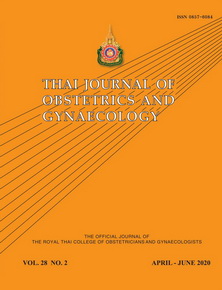Immunohistochemistry Staining for the Mismatch Repair Proteins in Endometrial Cancer Patients
Main Article Content
Abstract
Objective: Lynch syndrome (LS) increases the lifetime risks of endometrial cancer by approximately 40-60%. Although universal screening with immunohistochemistry (IHC) for MMR proteins has been recommended, it is not yet common in Thailand. This study aims to evaluate the prevalence of MMR deficiency and identify patients who may be at risk for LS.
Materials and Methods: IHC for MMR proteins, including MLH1, MSH2, MSH6, and PMS2, were tested in 156 endometrial cancer patients who underwent primary surgery between 2013-2015. .
Results: 57/156 (35.9%) patients had MMR deficiency; 42 experienced losses of MLH1 and PMS2, 10 experienced losses of MSH2 and MSH6, and 5 experienced a loss of MSH6 expression. Only 36 patients (23.1%) met the revised Bethesda guidelines; 29 patients (18.6%) were diagnosed earlier than age 50; 10 patients (6.4%) had synchronous colon or ovarian cancer; and only 13 patients (8.3%) possessed a family history of LS-related cancers. It was possible to detect MMR deficiency in 41/120 patients (34.2%) who did not meet the revised Bethesda guidelines.
Conclusion: MMR deficiency as a result of IHC can be detected in 35.9% of endometrial cancer patients. However, it was still possible to detect MMR deficiency in at least one-third of patients who did not meet the Bethesda guidelines. Screening endometrial cancer patients for MMR IHC should be considered, with the aim of diagnosing and preventing LS-related cancers in both patients and their relatives.
Article Details
References
2. GLOBOCAN. Estimated incidence, mortality and 5-year prevalence: women 2012 [Available from: https://globocan.iarc.fr/Pages/fact_sheets_population.aspx.
3. Lynch HT, Lynch PM, Lanspa SJ, Snyder CL, Lynch JF, Boland CR. Review of the Lynch syndrome: history, molecular genetics, screening, differential diagnosis, and medicolegal ramifications. Clin Genet 2009;76:1-18.
4. Hampel H, Frankel W, Panescu J, Lockman J, Sotamaa K, Fix D, et al. Screening for Lynch syndrome (hereditary nonpolyposis colorectal cancer) among endometrial cancer patients. Cancer Res 2006;66:7810-7.
5. Lancaster JM, Powell CB, Chen LM, Richardson DL. Society of Gynecologic Oncology statement on risk assessment for inherited gynecologic cancer predispositions. Gynecol Oncol 2015;136:3-7.
6. Barrow E, Hill J, Evans DG. Cancer risk in Lynch Syndrome. Fam Cancer 2013;12:229-40.
7. Umar A, Boland CR, Terdiman JP, Syngal S, de la Chapelle A, Ruschoff J, et al. Revised Bethesda Guidelines for hereditary nonpolyposis colorectal cancer (Lynch syndrome) and microsatellite instability. J Natl Cancer Inst 2004;96:261-8.
8. Egoavil C, Alenda C, Castillejo A, Paya A, Peiro G, Sanchez-Heras AB, et al. Prevalence of Lynch syndrome among patients with newly diagnosed endometrial cancers. PLoS One 2013;8:e79737.
9. Moline J, Mahdi H, Yang B, Biscotti C, Roma AA, Heald B, et al. Implementation of tumor testing for lynch syndrome in endometrial cancers at a large academic medical center. Gynecol Oncol 2013;130:121-6.
10. Long Q, Peng Y, Tang Z, Wu C. Role of endometrial cancer abnormal MMR protein in screening Lynch-syndrome families. Int J Clin Exp Pathol 2014;7:7297-303.
11. Rubio I, Ibanez-Feijoo E, Andres L, Aguirre E, Balmana J, Blay P, et al. Analysis of Lynch Syndrome Mismatch Repair Genes in Women with Endometrial Cancer. Oncology 2016;91:171-6.
12. Watkins JC, Yang EJ, Muto MG, Feltmate CM, Berkowitz RS, Horowitz NS, et al. Universal Screening for Mismatch-Repair Deficiency in Endometrial Cancers to Identify Patients With Lynch Syndrome and Lynch-like Syndrome. Int J Gynecol Pathol 2017;36:115-27.
13. Mills AM, Liou S, Ford JM, Berek JS, Pai RK, Longacre TA. Lynch syndrome screening should be considered for all patients with newly diagnosed endometrial cancer. Am J Surg Pathol 2014;38:1501-9.
14. Shia J. Immunohistochemistry versus microsatellite instability testing for screening colorectal cancer patients at risk for hereditary nonpolyposis colorectal cancer syndrome. Part I. The utility of immunohistochemistry. J Mol Diagn 2008;10:293-300.
15. Walsh M, Cummings M, Buchanan D, DambacherW, Arnold S, McKeone D, et al. Molecular, pathologic, and clinical features of early-onset endometrial cancer: identifying presumptive Lynch syndrome patients. Clin Cancer Res 2008; 4: 1692–1700.
16. Leenen CH, van Lier MG, van Doorn HC, van Leerdam ME, Kooi SG, de Waard J, et al. Prospective evaluation of molecular screening for Lynch syndrome in patients with endometrial cancer ≤ 70 years. Gynecol Oncol 2012; 125: 414–20.
17. Stelloo E, Jansen AML, Osse EM, Nout RA, Creutzberg CL, Ruano D, et al. Practical guidance for mismatch repair-deficiency testing in endometrial cancer. Ann Oncol 2017 ;28:96-102.
18. Talhouk A, McConechy MK, Leung S, Li-Chang HH, Kwon JS, Melnyk N, et al. A clinically applicable molecular-based classification for endometrial cancers. Br J Cancer 2015;113:299-310.
19. Stelloo E, Nout RA, Osse EM, Jurgenliemk-Schulz IJ, Jobsen JJ, Lutgens LC, et al. Improved Risk Assessment by Integrating Molecular and Clinicopathological Factors in Early-stage Endometrial Cancer-Combined Analysis of the PORTEC Cohorts. Clin Cancer Res 2016;22:4215-24.
20. Lu KH, Dinh M, Kohlmann W, Watson P, Green J, Syngal S, et al. Gynecologic cancer as a "sentinel cancer" for women with hereditary nonpolyposis colorectal cancer syndrome. Obstet Gynecol 2005;105:569-74.
21. Manchana T, Khemapech. Endometrial adenocarcinoma in young Thai women. Asian Pac J Cancer Prev. 2008;9:283-6.


